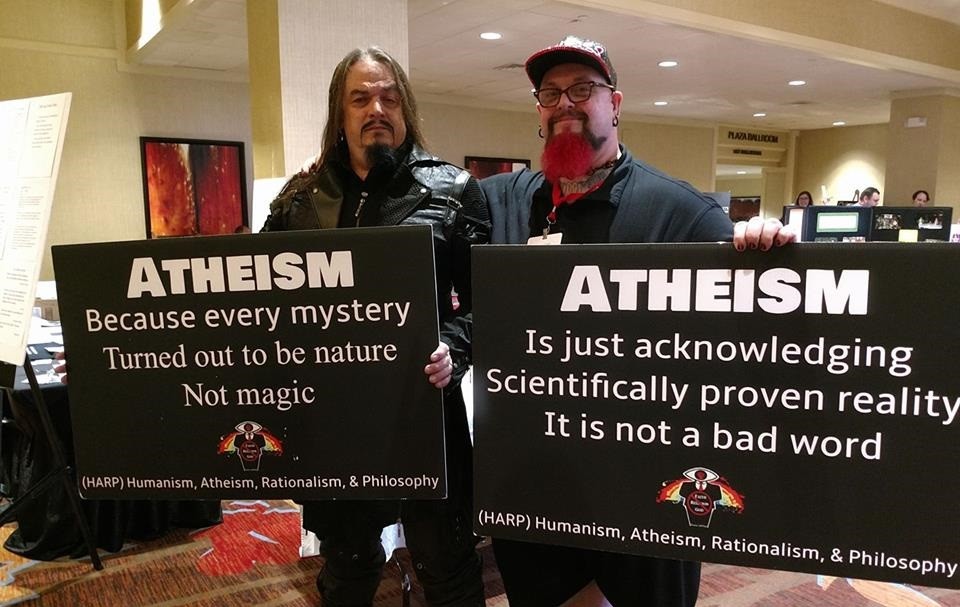
The picture is of Aron Ra and I from the American Atheist convention OKC 2018.
Meeting up with old Friends and Making new Friends at the American Atheists convention OKC
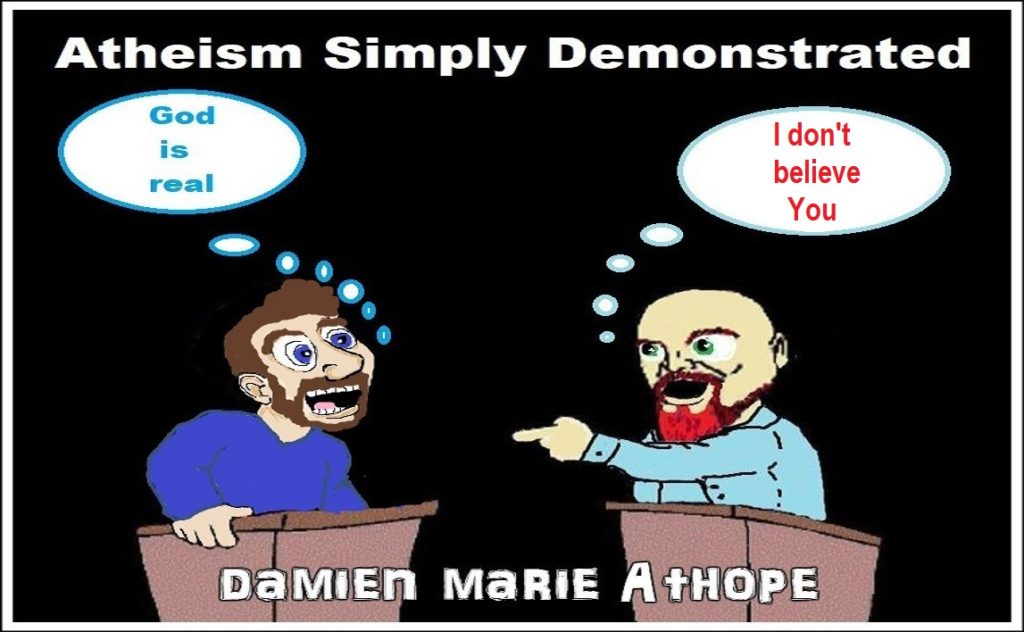
Naive Atheism: unjustified by scientific reality and unreasoned by logic
Reasoned Atheism: justified by scientific reality and reasoned by logic

Reasons for or Types of Atheism
Here is a comment on the picture of Aron Ra and I from the American Atheist convention OKC 2018.
Commenter – “Neither of those signs have anything to do with atheism. Atheism is simply a disbelief in gods. It has nothing to do with nature or acknowledging science proven reality.”
My response, So you can know what is or is not possible in reality without acknowledgement of science? And I guess you also can think without acknowledgement of logic? You presume both an acknowledgement of science and logic as well as many other things by making truth claims. And you are also not correct that atheism is limited to disbelief as it can simply be a lack of belief or a rejection of positive beliefs about the claims of gods.
Commenter – “IT STILL HAS NOTHING TO DO WITH ATHEISM!!”
My response, As if there is only one kid of atheism. Lol Such as, strong atheism or weak atheism are just two kinds of atheism persuasion to highlight it’s not one thing.
Commenter – “As a matter of fact there is only one kind of atheism. The one that negatively claims no gods exist. That is the entire scope of atheism’s claim. No science needed. It is a claim based upon a disbelief, nothing more.”
My response, What is a claim of fact without acknowledgement of science or logic? Atheism – By Branch / Doctrine – The Basics of Philosophy I think you need to learn more about atheism, or about philosophy.
Commenter – “Doctrine? You make it seem like religion. Is atheism a religion to you? Atheism is the opposite of religion to me”
My response, Read the link
Commenter – “I know plenty about both science and philosophy.”
My response, Obviously not enough.
Commenter – “Atheism may walk hand in hand with logic, reason and science, but being an atheist does not require the others to be had. They are mutually exclusive. Always will be.”
My response, There are many paths to atheism thinking or conclusion, which are not removed if you want others to agree or see your position as reasonable or supported like everything. One can make unjustified claims or anti-claims and nothing changes without acknowledgement of logic and science. Unless you want atheism to be unjustified claims not fixed to science understanding of reality? Or want unreasonable atheism not required to fit logic? “I don’t believe you” in the god exists question is referring to the claims of gods is the beginning of atheism but it is not even close to the end. People confuse all it takes to be an atheist “not believing” to be all there is of atheism, it’s not.
Commenter – “A = without; theism = belief in a god, religion. Theism = belief in a god. Do they have proof in a god? No, it is just a belief. To the contrary, but similar, atheism is the opposite belief, but just a belief. I don’t make the rules. The burden of proof is on the believer, not the unbeliever. No logic is needed for a disbelief. No science. No reason. Make atheism what you want, Harry Potter, I know what it is. Move on, Damien!! I am not the enemy.”
My response,
Naive Atheism: unjustified by scientific reality and unreasoned by logic
Reasoned Atheism: justified by scientific reality and reasoned by logic
My response, I only support reasoned atheism as an axiological atheist (value theorist atheist). My art as well. 😀
Another commenter to the first commenter,
“What do you base your rejection of Theism on? Do you just know on your heart there is no god? How did you come to Atheism? Luck of the draw?”
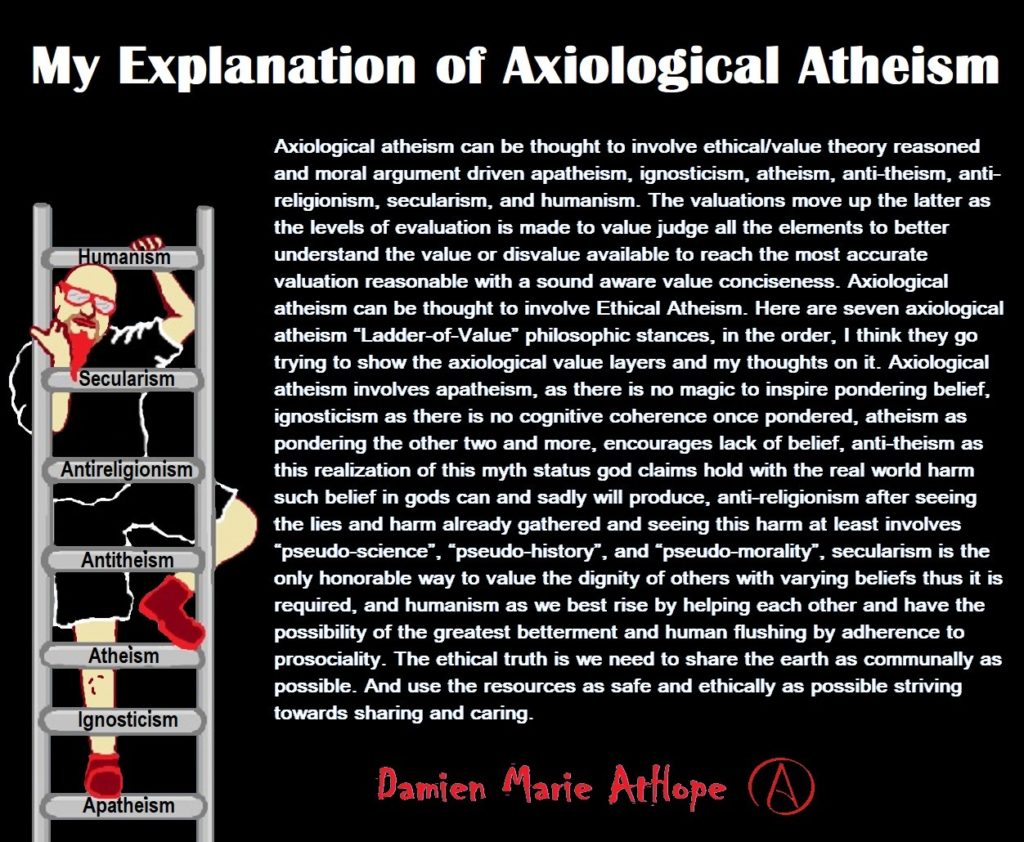
Axiological Atheism Explained
My response, No God: No evidence, No intelligence, and No goodness = Valid Atheism Conclusio
No evidence, to move past the Atheistic Null Hypothesis: There is no God/Gods (in inferential statistics, a Null Hypothesis generally assumed to be true until evidence indicates otherwise. Thus, a Null Hypothesis is a statistical hypothesis that there is no significant difference reached between the claim and the non-claim, as it is relatively provable/demonstratable in reality some way. “The god question” Null Hypothesis is set at as always at the negative standard: Thus, holding that there is no God/Gods, and as god faith is an assumption of the non-evidentiary wishful thinking non-reality of “mystery thing” found in all god talk, until it is demonstratable otherwise to change. Alternative hypothesis: There is a God (offered with no proof: what is a god and how can anyone say they know), therefore, results: Insufficient evidence to overturn the null hypothesis of no God/Gods.
No intelligence, taking into account the reality of the world we do know with 99 Percent Of The Earth’s Species Are Extinct an intelligent design is ridiculous. Five Mass Extinctions Wiped out 99 Percent of Species that have ever existed on earth. Therefore like a child’s report card having an f they need to retake the class thus, profoundly unintelligent design.
No goodness, assessed through ethically challenging the good god assumptions as seen in the reality of pain and other harm of which there are many to demonstrates either a god is not sufficiently good, not real or as I would assert, god if responsible for this world, would make it a moral monster ripe for the problem of evil and suffering (Argument from Evil). God would be responsible for all pain as life could easily be less painful and yet there is mass suffering. In fact, to me, every child born with diseases from birth scream out against a caring or loving
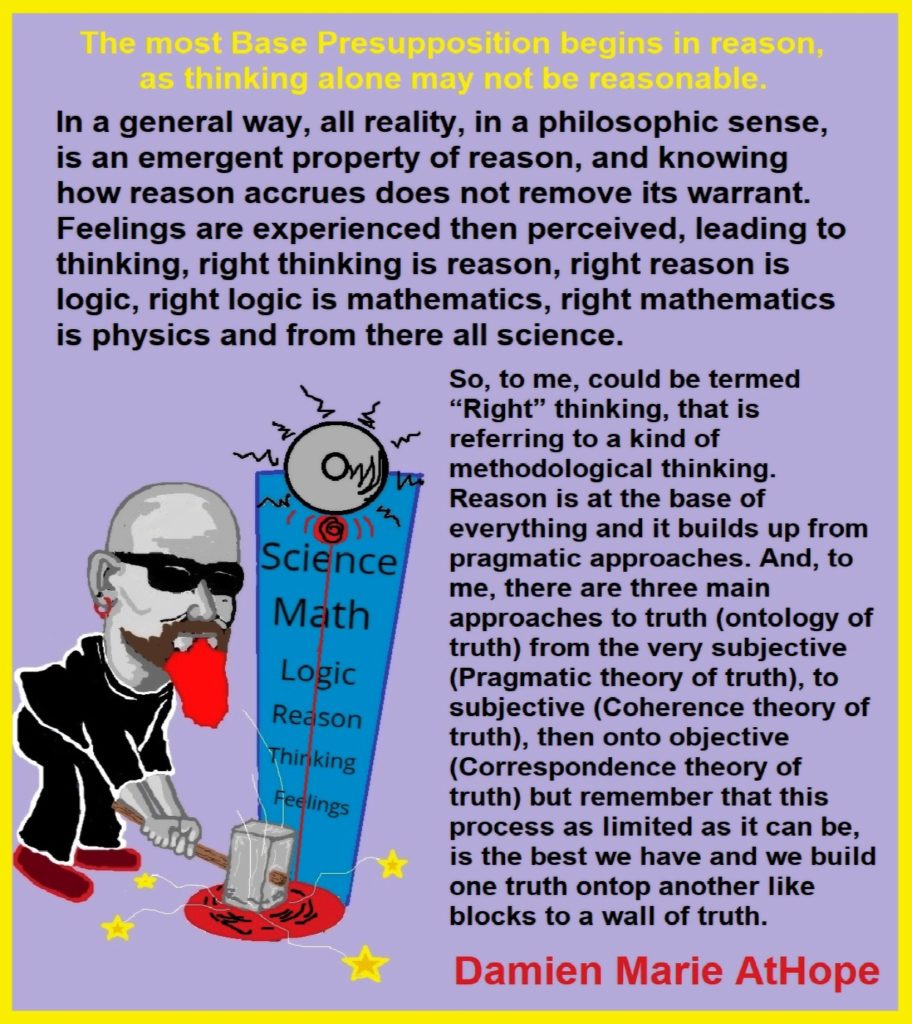
My response, Disproof by logical contradiction
‘A Logical Impossibility’
(especially in reductio ad absurdum arguments)
In classical logic, a contradiction consists of a logical incompatibility between two or more propositions. It occurs when the propositions, taken together, yield two conclusions which form the logical, usually opposite inversions of each other. Contradiction by the creation of a paradox, Plato’s Euthydemus dialogue demonstrates the need for the notion of contradiction. – Wikipedia
In the ensuing dialogue, Dionysodorus denies the existence of “contradiction”, all the while that Socrates is contradicting him: “… I in my astonishment said: What do you mean Dionysodorus? I have often heard, and have been amazed to hear, this thesis of yours, which is maintained and employed by the disciples of Protagoras and others before them, and which to me appears to be quite wonderful, and suicidal as well as destructive, and I think that I am most likely to hear the truth about it from you. – Wikipedia
The dictum is that there is no such thing as a falsehood; a man must either say what is true or say nothing. Is not that your position?” Indeed, Dionysodorus agrees that “there is no such thing as a false opinion … there is no such thing as ignorance” and demands of Socrates to “Refute me.” Socrates responds “But how can I refute you, if, as you say, to tell a falsehood is impossible?”. – Wikipedia
My response, To me, there simply is and rightly must be an intellectual “ethical-belief-responsibility” (burden of proof) to justify the believed truth that is claimed to others is actually demonstrably as being true with valid and reliable reason and/or evidence when it is stated as such. Yes, intellectually one should provide (justificationism) for their assertions that map the sort of governing good habits of belief-formation, belief-maintenance, and belief-relinquishment.
I am an Axiological (Theoretical and Normative VALUE Theorist philosopher) Atheist
Formal Axiology: Another Victim in Religion’s War on Science by Dr. Kelleher
Interview of Formal Axiological Atheist Dr. William Kelleher
My response, Axiology and Value Theory?
“Value theory is a range of approaches to understanding how, why, and to what degree persons value things; whether the object or subject of valuing is a person, idea, object, or anything else. This investigation began in ancient philosophy, where it is called axiology or ethics.”– Wikipedia
“The term “Value Theory” is used in at least three different ways in philosophy. In its broadest sense, “value theory” is a catch-all label used to encompass all branches of moral philosophy, social and political philosophy, aesthetics, and sometimes feminist philosophy and the philosophy of religion — whatever areas of philosophy are deemed to encompass some “evaluative” aspect. In its narrowest sense, “value theory” is used for a relatively narrow area of normative ethical theory particularly, but not exclusively, of concern to consequentialists. In this narrow sense, “value theory” is roughly synonymous with “axiology”. Axiology can be thought of as primarily concerned with classifying what things are good, and how good they are. – (Stanford Encyclopedia of Philosophy)
For instance, a traditional question of axiology concerns whether the objects of value are subjective psychological states or objective states of the world. But in a more useful sense, “value theory” designates the area of moral philosophy that is concerned with theoretical questions about value and goodness of all varieties — the theory of value. The theory of value, so construed, encompasses axiology, but also includes many other questions about the nature of value and its relation to other moral categories. – (Stanford Encyclopedia of Philosophy)
The division of moral theory into the theory of value, as contrasting with other areas of investigation, cross-cuts the traditional classification of moral theory into normative and metaethical inquiry, but is a worthy distinction in its own right; theoretical questions about value constitute a core domain of interest in moral theory, often cross the boundaries between the normative and the metaethical, and have a distinguished history of investigation.” – (Stanford Encyclopedia of Philosophy)
and metaethical inquiry, but is a worthy distinction in its own right; theoretical questions about value constitute a core domain of interest in moral theory, often cross the boundaries between the normative and the metaethical, and have a distinguished history of investigation.” – (Stanford Encyclopedia of Philosophy)
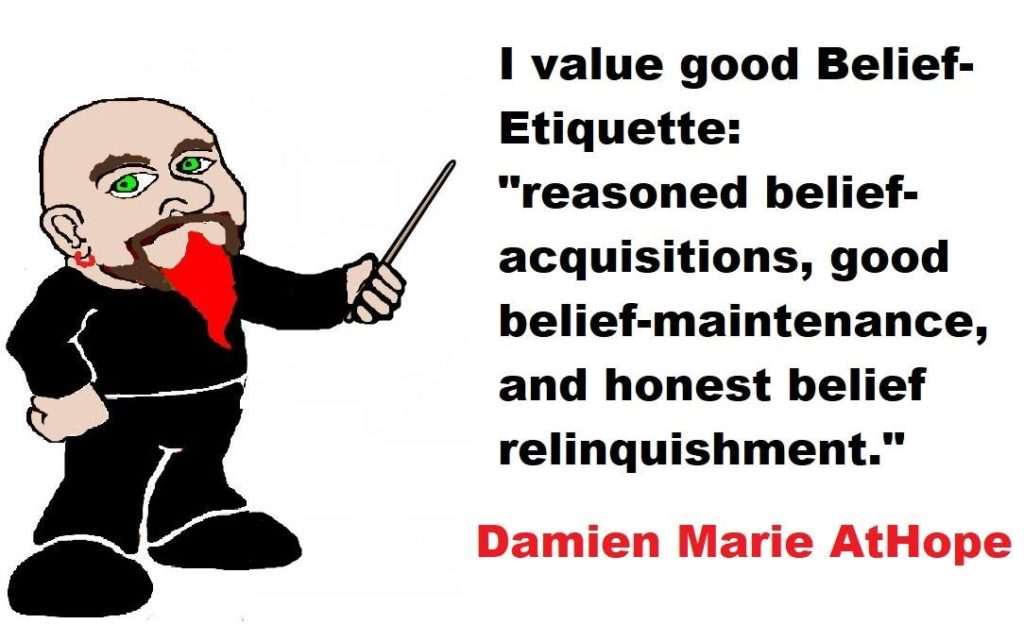
Damien Marie AtHope: Axiological Atheist, Anti-theist, Anti-religionist, Secularist, Humanist, Rationalist, Writer, Artist, Poet, Philosopher, Advocate, Activist, with schooling in Psychology and Sociology as well as an Autodidact in Science, Archeology, Anthropology, and Philosophy. Damien Promotes Science, Realism, Axiology, Liberty, Justice, Ethics, Anarchism, Socialism, Progressivism, Liberalism, Philosophy, Psychology, Archaeology, and Anthropology; advocating for Sexual, Gender, Child, Secular, LGBTQIA+, Race, Class Rights, and Equality.
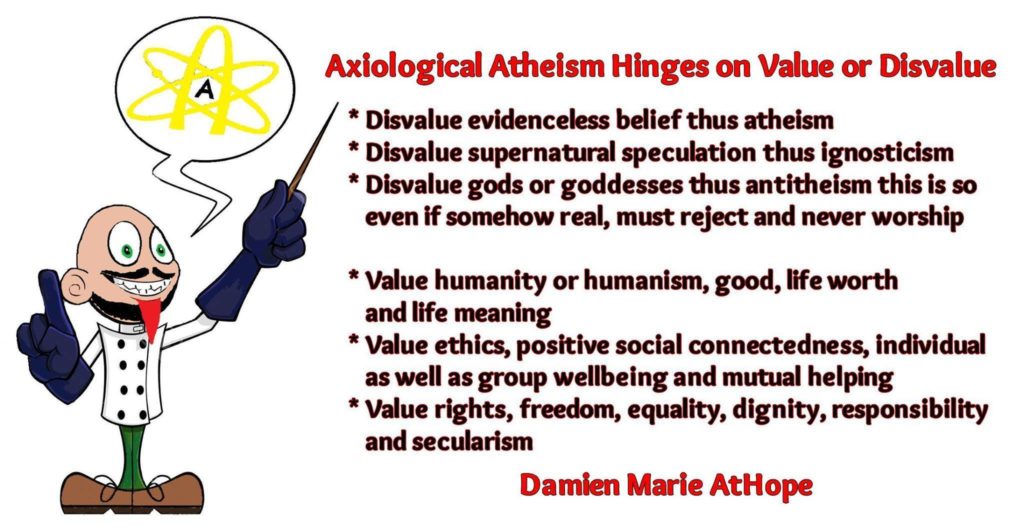
AMy response, Axiological “Presumptive-Value”
Your god myth is an Axiological “Presumptive-Value” Failure
I am an Axiological (value theorist) Atheist, and Claims of god are a Presumptive-Value failure. Simply, if you presume a thing is of value that you can’t justify, then you have committed an axiological presumptive value failure.
Axiological “presumptive-value” Success: Sound Thinker: uses disciplined rationality (sound axiological judgment the evaluation of evidence to make a decision) supporting a valid and reliable justification.
Axiological “presumptive-value” Failure: Shallow Thinker: undisciplined, situational, sporadic, or limited thinking (unsound axiological judgment, lacking required evidence to make a “presumptive-value” success decision) lacking the support of a needed valid and reliable justification.
My response, Often I get disheartened to see that so many people can look at the unknown or that which is devoid of any and all understanding and claim to know that this is evidence for some god or another. How can they with all honesty even say that they somehow already know about an established scientific unknown, when all along it is what it ever was, which I will remind you, is currently holding a confirmed status of unknown. Thus, still fully intact as currently unknowable (I.e. you simply cannot justifiability claim that such unknown is god or evidence of god). What really is a god anyway? The term god equals mystery that is used to explain the mysterious leaving us with yet more mystery, thus explains nothing. Claims of god are a Presumptive-Value failure. Simply, if you presume a thing is of value that you can’t justify, then you have committed an axiological presumptive value failure. Axiological “presumptive-value” Success: Sound Thinker: uses disciplined rationality (sound axiological judgment the evaluation of evidence to make a decision) supporting a valid and reliable justification.
“Ok, So basically, the difference between reasoning with evidence and without?” – Questioner
My response, Well with or without valid justification because of evidence. As in you can’t claim to know the value of something you can’t demonstrate as having good qualities to attach the value claim too so if you lack evidence of the thing in question then you cannot validate its value. So it’s addressing a kind of justificationism (uncountable) Theory of justification, An (philosophy standard) approach that regards the justification of a claim as primary, while the claim itself is secondary; thus, criticism consists of trying to show that a claim cannot be reduced to the authority or criteria that it appeals to. Think of is as a use-matrix. If I say this is of great use for that, can you validate its use or value, and can I use this as a valid method to state a valid justification for my claims without evidence to value judge from? No, thus an axiological presumptive-value failure as a valid anything.
My response, Theory of justification is a part of epistemology that attempts to understand the justification of propositions and beliefs. Epistemologists are concerned with various epistemic features of belief, which include the ideas of justification, warrant, rationality, and probability. Loosely speaking, justification is the reason that someone (properly) holds a belief. When a claim is in doubt, justification can be used to support the claim and reduce or remove the doubt. Justification can use empiricism (the evidence of the senses), authoritative testimony (the appeal to criteria and authority), or reason. – Wikipedia
“Presumptions are things that are credited as being true until evidence of their falsity is presented. Presumptions have many forms and value (Axiology) is just one. In ethics, value denotes the degree of importance of something or action, with the aim of determining what actions are best to do or what way is best to live (normative ethics), or to describe the significance of different actions. It may be described as treating actions as abstract objects, putting VALUE to them. It deals with right conduct and living a good life, in the sense that a highly, or at least relatively high valuable action may be regarded as ethically “good” (adjective sense), and that an action of low value, or relatively low in value, may be regarded as “bad”. What makes an action valuable may, in turn, depend on the ethic values of the objects it increases, decreases or alters. An object with “ethic value” may be termed an “ethic or philosophic good” (noun sense). Values can be defined as broad preferences concerning appropriate courses of actions or outcomes. As such, values reflect a person’s sense of right and wrong or what “ought” to be. “Equal rights for all”, “Excellence deserves admiration”, and “People should be treated with respect and dignity” are representatives of values. Values tend to influence attitudes and behavior and these types include ethical/moral values, doctrinal/ideological(religious, political) values, social values, and aesthetic values. It is debated whether some values that are not clearly physiologically determined, such as altruism, are intrinsic, and whether some, such as acquisitiveness, should be classified as vices or virtues.” ref, ref
My response, The Way of a Sound Thinker?
“Sound thinking to me, in a general way, is thinking, reasoning, or belief that tends to make foresight a desire to be as accurate as one can with valid and reliable reason and evidence.”
Sound axiological judgment, to me, a “presumptive-value” success, is value judged opinions expressed as facts with a valid and reliable justification. In an informal and psychological sense, it is used in reference to the quality of cognitive faculties and adjudicational (relating to adjudication) capabilities of particular individuals, typically called wisdom or discernment. In a legal sense, – used in the context of a legal trial, to refer to a final finding, statement, or ruling, based on a considered weighing of evidence, called, “adjudication“.
My response, A shallow thinker (i.e. not a Deep Thinker, a person whose thoughts are reasoned, methodological, logical, empirical, profound; an intellectual) quickly talks, often with boastful postulations, likely just as often pushed strongly and loudly as if this adds substance, and they do this before fully understanding what’s is really involved. Whereas, a Sound Thinker is reasoned (comparativemore reasoned, superlativemost reasoned) generally based on reasoning; being the result of logical thought. As a first debate process, a Sound Thinker commonly poses Questions to understand slowing down and assessing all the facts or factors involved and then builds their argument or ideas. In classical logic, the law of non-contradiction (LNC) (also known as the law of contradiction, principle of non-contradiction (PNC), or the principle of contradiction) states that contradictory statements cannot both be true in the same sense at the same time, e.g. the two propositions “A is B” and “A is not B” are mutually exclusive. It is the second of the three classic laws of thought.
My response, Lastly, let me make this clear, Sound Thinkers don’t value FAITH!
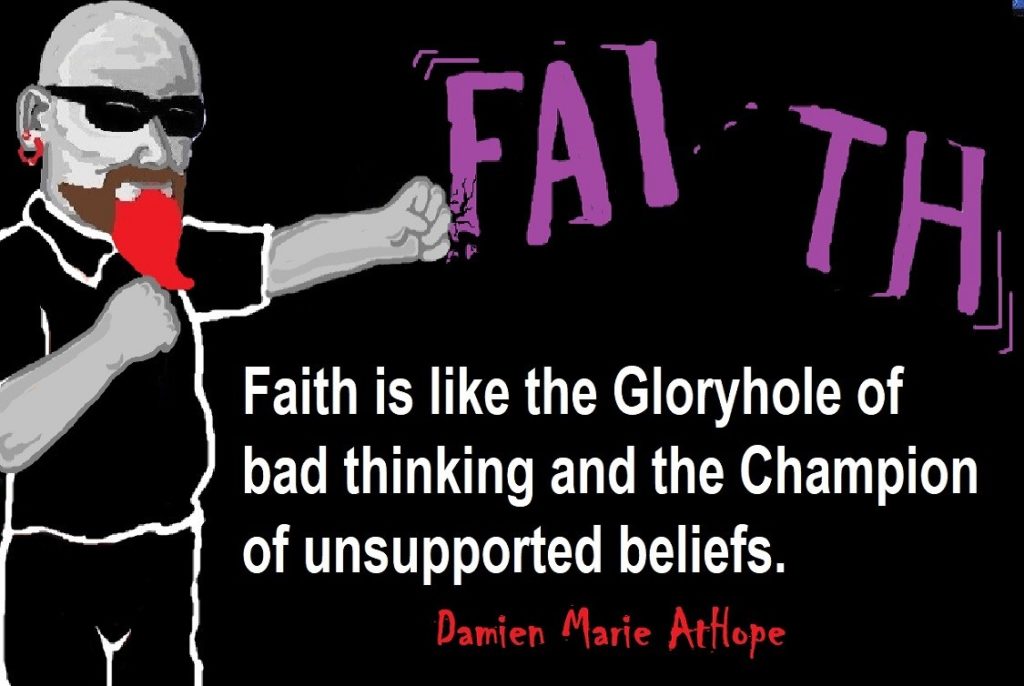
Critical Thinking, What Does it Mean to Be Open to Learn?
A General Thinking in all My Epistemology Theorizing is Justificationism
“Damien, I am an atheist but I have faith in gravity tho, but it isn’t exactly “faith.” – Challenger
My response, “No, I don’t agree, you don’t have faith in gravity or gravitation, as it is “a fundamental force” you have proof or if lacking some direct proof would use inference and if even less evidence you use conjecture, not faith. Do you gauntly thinking you need faith in gravity because you wonder or worry that when walking down a set of stairs that you going to fall back up? You don’t need faith (strong belief without evidence) as there is massive proof, almost to the point that it is easily self-evident. You don’t need faith (strong belief without evidence) for anything, as if its warranted it will or should have evidence or it doesn’t deserve not only strong belief but any amount of belief at all as sound beliefs need something to ground their worthiness in relation to reality; the only place evidence comes. Sound thinking to me, in a general way, is thinking, reasoning, or belief that tends to make foresight a desire to be as accurate as one can with valid and reliable reason and evidence.
“Gravity, or gravitation, is a natural phenomenon by which all things with mass are brought toward (or gravitate toward) one another, including planets, stars, and galaxies.” Ref
“Gravity is responsible for various phenomena observed on Earth and throughout the Universe; for example, it causes the Earth and the other planets to orbit the Sun, the Moon to orbit the Earth, the formation of tides, the formation and evolution of the Solar System, stars and galaxies. Since energy and mass are equivalent, all forms of energy, including light, also cause gravitation and are under the influence of it. On Earth, gravity gives weight to physical objects and causes the ocean tides. The gravitational attraction of the original gaseous matter present in the Universe caused it to begin coalescing, forming stars – and the stars to group together into galaxies – so gravity is responsible for many of the large-scale structures in the Universe.” Ref
Understanding how children use magical thinking
My response, Dogmatic–Propaganda vs. Disciplined-Rationality
Religionists and fideists, promote Dogmatic-Propaganda whereas atheists and antireligionists mostly promote Disciplined-Rationality. Dogmatic–Propaganda commonly is a common motivator of flawed or irrational thinking but with over seventy belief biases identified in people, this is hardly limited to just the religious or faith inclined. Let me illustrate what I am saying, to me all theists are believing lies or irrationally in that aspect of their lives relating to god belief. So the fact of any other common intellectual indexers where there may be “right” reason in beliefs cannot remove the flawed god belief corruption being committed. What I am saying is like this if you kill one person you are a killer. If you believe in one “god” I know you are a follower of Dogmatic-Propaganda and can not completely be a follower of Disciplined-Rationality. However, I am not proclaiming all atheists are always rational as irrationally is revolving door many people believe or otherwise seem to stumble through. It’s just that god belief does this with intentionally.
Disciplined-Rationality is motivated by principles of correct reasoning with emphasis on valid and reliable methods or theories leading to a range of rational standpoints or conclusions understanding that concepts and beliefs often have consequences thus hold an imperative for truth or at least as close to truth as can be acquired rejecting untruth. Disciplined-Rationality can be seen as an aid in understanding the fundamentals for knowledge, sound evidence, justified true belief and involves things like decision theory and the concern with identifying the value(s), reasonableness, verification, certainties, uncertainties and other relevant issues resulting in the most clear optimal decision/conclusion and/or belief/disbelief. Disciplined-Rationality attempts to understand the justification or lack thereof in propositions and beliefs concerning its self with various epistemic features of belief, truth, and/or knowledge, which include the ideas of justification, warrant, rationality, reliability, validity, and probability.
ps. “Sound Thinker”, “Shallow Thinker”, “Dogmatic–Propaganda” & “Disciplined-Rationality” are concepts/terms I created*A
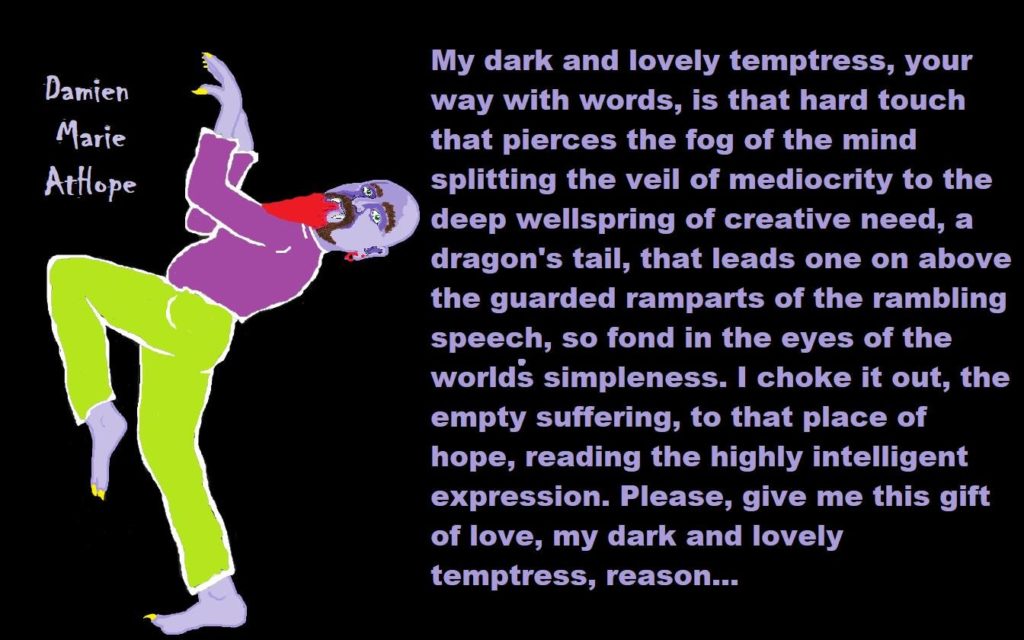
Axiological Atheism not Nihilist Atheism
Other commenter – “Damien, this comes up for me often. It drives me batshit. Bigots, sexists, gunnuts, homophobes, xenophobes that are atheist. Makes no sense. I am a STRONG atheist and anti-theist because I’m driven by the data. I caught all kinds of hell for embracing the A+ idea and the “Bright” label. It has become glaringly apparent that a person that calls themselves an atheist might not be a freethinker. Every freethinker I have ever met was/is atheist. Not all Atheists are Freethinkers. My 40% of a nickel.”
First commenter – “It does not matter what any atheist bases/based their decision on to become an atheist. It is only a disbelief. Many roads lead to Rome and many roads lead to atheism. The end result is still only a belief. The reasons don’t have to be logical, scientific or even agree with yours. Tough shit! I’m sorry you think your signs are so fucking important. They’re not and they certainly don’t have anything to do with atheism after someone disbelieves in gods. Not every atheist believes in the Big Bang, not every atheist is a liberal. Tell me, in your infinite wisdom and philosophy knowledge, what else does atheism encompass? Are you the atheist oracle? Oh, yeah, you’re not. So stop telling everyone what you think they should believe. You’re an ass if you think you speak for everyone else. Damien, there is no such term as naive atheist. Try again. It sounds like you’re just trying to make a name for yourself by making your own belief system. I’m not impressed. And Damien, There are theists that help scientific endeavors. They aren’t atheists. So what now? Epistemology, science, reason and logic may lead you to a conclusion of atheism. Those are roads to atheism, but atheism does not need them. Atheism is the destination not the journey. You are mixing the two and saying they are inseparable. I disagree, They are mutually exclusive. Damien, this says, “valuations move up the ‘latter’.” You need some vocabulary lessons.”
My response, You have demonstrated that there is indeed naive atheism as it is what you are claiming. Stanford Encyclopedia of Philosophy on Value Theory.
Formal Axiology: Another Victim in Religion’s War on ScienceYou need to read that link.
First commenter – “Knowledge = Justified, True, Belief; a commonly held definition in epistemology. Without all three of these elements it is difficult to prove a fact. Belief is only one part of this definition. Atheism, a disbelief or requires one to believe there are no gods. Belief is the only part religious people require to think their god exists. A child with no scientific coaching can believe a god exists as easily as he can believe no god exists. No science is needed. You don’t seem to get that at all. Damien Marie AtHope, I don’t need to do anything you say.”
My response, Well, I already get you don’t wish to value reason and this will be prone to many thinking errors both now and in the future if you don’t correct this limitation. I mind willing to see itself as wrong has just become a free thinker. I will you the best with reason. I wish y would listen to someone more knowledgeable at philosophy then you if you refuse to learn from me. You need more philosophy understanding as well as a better precision of logic but feel free to keep looking bad if you wish. As for a spelling mistake thanks for pointing it out, so I can correct it. See, that is how a freethinker acts. They welcome truth, even from ones they disagree as I don’t let ego overpower my reason can you claim the same? Remember, I can fix a spelling error but I will admit a need to improve your thinking and I am assuming not as there you are not thinking right here but instead seem to be championing this expressed thinking limitation, yet do not want to change.
*(Ontology) What are you talking about, please slow down and give me each specific detail individually?
*(Epistemology) How do you know that and why do you think it is justified or warranted?
*(Axiology) What is its value if any and why do you value that or why would anyone?
If you don’t already know, Dialectic is the art of investigating or discussing the truth of opinions.
The Difference in Epistemology and Ontology Thinking
My response, What I am saying is one cannot say “truth is…” (epistemology thinking) until they have the (ontology thinking) of the “thingness” of truth (ontology: the nature of being, becoming, existence or reality as well as the basic categories of being and their relations).
My response, The part “truth is…” wishes to explain (epistemology thinking) nature of a “thing” or its “thingness” (ontology thinking). So, the “is” part (epistemology thinking) means the attached characteristics of the “thing” called truth (ontology) when the epistemological question is offered without acknowledging or establishing the thing being called truth (ontology thinking).
My response, Ontology (Greek meaning ontos, “being; that which is”; and logos meaning “discourse, study, ratio, calculation, reason”) Ontology is the philosophical study of the nature of being, becoming, existence, or reality, as well as the basic categories of being and their relations.
My response, Epistemology (Greek episteme, meaning “knowledge, understanding”, and logos, meaning “discourse, study, ratio, calculation, reason”) it is the theory of knowledge, especially with regard to its methods, validity, and scope. Epistemology is the investigation of what distinguishes justified belief from opinion.
My response, Axiology (Greek meaning axia, “value, worth”; and logos meaning “discourse, study, ratio, calculation, reason”) it is the philosophical study of value as well as ethics and aesthetics. Formal Axiology is a specific branch of the science of Axiology. Axiology also studies of goodness, value or worth, in the widest sense of these terms. Its significance lies in the unification that it has provided for the study of a variety of questions—economic, moral, aesthetic, and even logical.
The religious believe there is a god without proof, without justification, yet they believe. What mechanism are they using with just belief backing them up?
“Epistemic rationality is part of rationality involving, achieving accurate beliefs about the world. It involves updating on receiving new evidence, mitigating cognitive biases, and examining why you believe what you believe.” https://wiki.lesswrong.com/wiki/Rationality
My response, Religion and Science are Completely Different Epistemologies
Some try to say that science and religion ear not that different saying they both use faith. This is utter nonsense, not only does science not use faith as a method for anything, religion and science are completely different epistemologies. Scientists reason differently than most nonscientists because of a standardized focus on scientific based reasoning and scientific epistemology.
A basic outline of scientific epistemology:
Science: Hypotheses (Rationalism/Deductive, Inductive, or Abductive Reasoning etc.) + Testing (Empiricism/Systematic Observation) – Checking for errors (Skepticism/Fallibilism) + Interpret/Draw a Conclusion (Rationalism/Deductive, Inductive, or Abductive Reasoning etc.) *if valid* = Scientific Laws (describes observed phenomena) or Scientific Theory (substantiated and repeatedly tested explanation of phenomena) = Justified True Belief = Scientific Knowledge = Epistemic Certainty supportive of correctability
*being epistemic certainty is believing a truth has the highest epistemic status, often with warranted psychological certainty but it may not, neither is it a requirement*
A basic outline of religious epistemology:
Religion: Culture/Testimony/ Myths/Scriptures/Revelation/Prophecies (arbitrary and unjustified way of coming to ideas or Idealism) + Mysticism, Supernaturalism, Spirtualism, or Theology (arbitrary and unjustified to form explanations, Idealism or misuse of Rationalism; often self-justified or even believe they are beyond a need for justification) – Denial of Relevant Alternatives and Basis (Fideism/Dogmatic Foundationalism/Pseudo-Skepticism/Anti-Rationalism/Anti-Empiricism or Anti-Skepticism) + Superstition, Falsehood, Misconception, Fantasy, or Delusion (unsubstantiated ideas and unjustified way of coming to ideas or Idealism) = Religion Reality Theory = Unjustified Untrue Faith Belief = Religion Faith or Beliefs as Knowledge = Unwarranted Psychological Certainty supportive of incorrectability
*being psychologically certain believing a truth does not mean that something is not actually false*
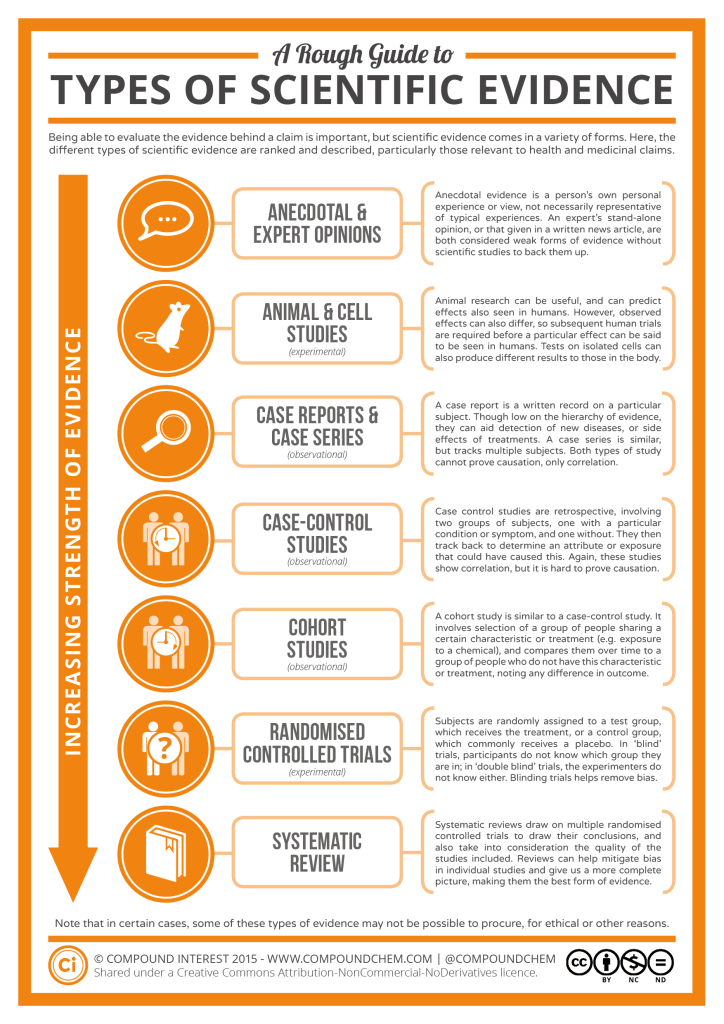
My response, Justified / True / Beliefs?
Justified / True / Beliefs: *To established justification, I use the philosophy called Reliabilism.
Reliabilism is a general approach to epistemology that emphasizes the truth-conduciveness of a belief-forming process, method, or other epistemologically relevant factor. The reliability theme appears both in theories of knowledge and theories of justification.
Justified / True / Beliefs: *For the true part I use the philosophy called The Correspondence Theory of Truth.
The correspondence theory of truth states that the truth or falsity of a statement is determined only by how it relates to the world and whether it accurately describes (i.e., corresponds with) that world.
Justified / True / Beliefs: *For the beliefs part I use what philosophy calls The Ethics of Belief.
The “The Ethics of Belief” refers the intersection of epistemology, philosophy of mind, psychology, and ethics. The central is norms governing our habits of belief-formation, belief-maintenance, and belief-relinquishment. It morally wrong (or epistemically irrational, or imprudent) to hold a belief on insufficient evidence. It morally right (or epistemically rational, or prudent) to believe on the basis of sufficient evidence, or to withhold belief in the perceived absence of evidence. It always obligatory to seek out all available epistemic evidence for a belief.
Stanford Encyclopedia of Philosophy on Reliabilist Epistemology, The Correspondence Theory of Truth, and The Ethics of Belief
First commenter – “I understand that an adult is using science and reason to be apologetic as an atheist. I agree with you in that matter. Where I disagree is when someone of lesser mental ability or state (like a child) can be told, there is no god and they simply believe because they were told. Do that make sense?”
Other commenter – “Dude!? What the fuck is wrong with , “Hmmmmm, that does make sense. Thanks for adding to my knowledge.” You spent all that energy trying to make a point that doesn’t make sense and then add that equivocating “kid” statement at the end. Dude yeah your an atheist but you damn sure ain’t a freethinker. You got some intellectual evolution to go through.”
Interview of Formal Axiological Atheist Dr. William Kelleher
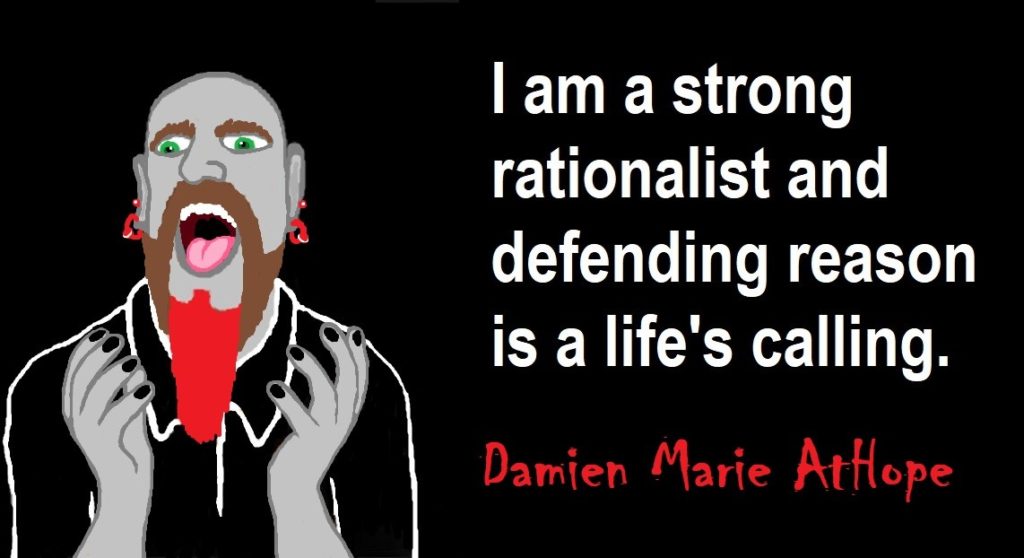
I am a “Scientific Axiology” minded “Philosophic Axiologist.”
*Philosophic Axiology (Value Theory)
“Scientific Axiology (Formal Axiology).
Axiological atheism can be thought to involve ethical/value theory reasoned and moral argument driven apatheism, ignosticism, atheism, anti-theism, anti-religionism, secularism, and humanism. The valuations move up the latter as the levels of evaluation is made to value judge all the elements to better understand the value or disvalue available to reach the most accurate valuation reasonable with a sound aware value conciseness. Axiological atheism can be thought to involve Ethical Atheism.
Below shows the 7 axiological atheism argument flow to show the value layers and my thoughts on it:
1. Apatheism: we are born and by the fact reality is devoid of magic removes theological desires to understand the obvious naturalistic world, until we learn otherwise. (a “presumptive-value” failure, thus no motivation to adequately start the evaluation needed to understand if there is real value for an Axiology assessment to accurately place it in the value hierarchy). = no value
2. Ignosticism: Sees theological arguments and language as equivocation, contradictory, and/or un-cognitively relatable other than emotionalism or the like. I see Ignosticism as using the Theological non-cognitivism arguments of “mind understanding issues” (rationalism challenging) and an evidentialist/verificationist arguments of “lacking evidence issues” (empiricism challenging). As an atheist, I am a person who disbelieves or lacks belief in the existence of god or gods. In my non-belief, I am also ignostic feeling that every theological position assumes too much about the concept of god(s).
As an ignostic, I am a person who rational no idea of anything from reality whatever to label as “a concept of god” thus I can say I have no idea of anything that can connect to the term god and no reason to think anyone else can either. (again a “presumptive-value” failure, no good Ontology of the thing for Identifying values that could influence belief but without what is needed to understand if there is real value for an axiology assessment to accurately place it in the value hierarchy). = no value
3. Atheism: How can we not reject the concept of gods, aka: supposed supreme magical beings, when not even some simple magic is supported in reality. So how then is it not even more ridiculous to claim some supreme magic aka: gods which are even further from reality. May I remind you that faith in the acquisition of knowledge is not a valid method worth believing in. Because, what proof is “faith”, of anything religion claims by faith, as many people have different faith even in the same religion?
As an atheist, I am a person who disbelieves or lacks belief in the existence of god or gods. In my non-belief, I am also ignostic feeling that every theological position assumes too much about the concept of god(s). As an ignostic, I am a person who rational no idea of anything from reality whatever to label as “a concept of god” thus I can say I have no idea of anything that can connect to the term god and no reason to think anyone else can either. Atheists talk about gods and religions for the same reason doctors talk about cancer, they are looking for a cure or a firefighter talking about fires because they burn people and they care to stop them.
We atheists too often feel a need to help the victim’s of mental slavery, held in the bondage that is the false beliefs of gods and the conspiracy theories of reality found in religions. If you think you believe in a god, “what do you mean by god,” saying a name tells me not one thing about the thing I am asking to know “its” beingness / thingness / attributes / qualities. Thus, what is the thing “god” to which you are talking about and I want you to explain its beingness /thingness / attributes/ qualities? Religious/theistic people with supernatural beliefs often seem as though they haven’t thought much about and that is something we can help using ontology questions about the beingness / thingness / attributes/ qualities they are trying to refer too. What do you mean by god, when you use the term god? And, I am not asking you for the name you attach to the thing you label as a god. I don’t need to know what the god you believe is known “by.” I am asking, what is the thing you are naming as a god and what that thing is, its qualities in every detail like all things have if they are real.
Are you just making stuff up or guessing/hoping or just promoting unjustified ideas you want to believe, what is a god? As an atheist, I feel more wonder than I did as a theist because I thought, “big deal” to any wonder I experienced, thinking god could do anything. So with such an unrealistic mindset, everything lost its wonder but it’s the opposite as an atheist. As a theist, the world was full of superstitions and supernatural magic possibilities and thus utilized thinking that was not in the real world. As an atheist all I have now is the real world, not that all atheists seem to get this, we all are in a real world devoid of magic anything, therefore, everything adds to my feeling of awe. There should be little debate with atheist acknowledging discernable reality compared to theists with non-reality claims. Yes, I have way more awe and wonder as an atheist than I ever had as a theist because as a theist anything was possible with god. Therefore, as a theist things where not that amazing.
However, as an atheist grasping what an absolute accidental or how random things are, with a 95 to 99 % of all life ever existing on this planet went extinct. I am thoroughly amazed we are even here the evolved children of ancient exploded stars, likely born in galaxies born in super-massive black holes, it’s all amazing. There is no evidence for Gods. But is their proposition outside of reason? As always start in reality from the evidence we do know, such as never in the history of scientific research or investigation has any supernatural claims shown to be true. So it is completely outside of possibility and is utterly ridiculous.
Therefore, belief should be rejected as there are no warrants at all and it is axiologically unworthy to such a preponderance to demand disbelief. (yet again a “presumptive value” failure, no good Ontology of the thing not the cognitively meaningful claims relatable to reality that must be attached to all magic and gods claims for Identifying values that could influence belief but without what is needed to understand if there is real value for an axiology assessment to accurately place it in the value hierarchy).
4. Antitheism: Anti-theism requires more than either merely disbelieving in gods or even denying the existence of gods. Anti-theism requires a couple of specific and additional beliefs: first, that theism is harmful to the believer, harmful to society, harmful to politics, harmful, to culture, etc.; second, that theism can and should be countered in order to reduce the harm it causes. If a person believes these things, then they will likely be an anti-theist who works against theism by arguing that it be abandoned, promoting alternatives, or perhaps even supporting measures to suppress it. It’s worth noting here that, however, unlikely it may be in practice, it’s possible in theory for a theist to be an anti-theist.
This may sound bizarre at first, but remember that some people have argued in favor of promoting false beliefs if they are socially useful. To me, I think many may have a misconception of the term. Atheism and anti-theism so often occur together at the same time and in the same person that it’s understandable if many individuals fail to realize that they aren’t the same. Making a note of the difference is important, however, because not every atheist is anti-theistic and even those who are, aren’t anti-theistic all the time. Atheism is simply the absence of belief in gods; anti-theism is a conscious and deliberate opposition to theism.
Many atheists are also anti-theists, but not all and not always. To me as an antitheist, I see the concept of gods antihumanistic and wholly harmful to a free humanity and if the so-called gods somehow do end up being real that I will switch to direct opposition as I would any tyrant oppressing humanity. Antitheism (sometimes anti-theism) is a term used to describe an opposition to theism. The term has had a range of applications and definitions. In secular contexts, it typically refers to direct opposition to the validity of theism, but not necessarily to the existence of a deity. As an anti-theist, I am a person who is active in opposition to theism: both the concepts of god(s) as well as the religions that support them.
This is because theistic concepts and theistic religions are harmful and that even if theistic beliefs were true, they would be undesirable. (And, again a “presumptive value” failure, of the other value challenges of the lesser evaluations and value judgments addressed in theapatheism, ignosticism, atheism value judgment conclusion and an Axiological Atheism assessment of the god concept that must be attached to all magic and gods claims Identifying a lack of value and/or disvalue that influence harm to real value in an axiology assessment to accurately place its value violations in the value hierarchy).
5. Antireligionism: Not just Atheist, axiological atheists should be antitheists but this generally will involve anti-religionism. it would generally thus hold anti-religionist thinking. Especially, I am an anti-religionist, not just an atheist, and here is why summed up in three ideas I am against. And, in which these three things are common in all religions: “pseudo-science”, “pseudo-history”, and “pseudo-morality”. And my biggest thing of all is the widespread forced indoctrination of children, violating their free choice of what to not believe or believe, I hate forced hereditary religion. And my biggest thing of all is the widespread forced indoctrination of children, violating their free choice of what to not believe or believe, I hate forced hereditary religion. As well as wish to offer strong critiques regarding the pseudo-meaning of the “three letter noise” people call “G.o.d” (group originated delusion)!
As an anti-religionist, I am a person who can look at religion on the whole and see it is detrimental to the progress of humanity thus am in opposition to all and every religion, not even just opposition to organized religion. In case you were wondering, I am anti-pseudoscience, anti-supernatural, and anti-superstition as well. May I not be a silent watcher as millions of children are subjugated almost before their birth let alone when they can understand thought and are forcibly coerced, compelled, constrained, and indoctrinated in the mental pollution that religion can be. My main goal against religion is to fully stop as much as possible forced indoctrination, one could ask but then why do I challenge all adults faith?
Well, who do you think is doing the lying to children in the first place. End Hereditary religion, if its a belief let them the equal right to choose to believe. “Religion is an Evolved Product” and Yes, Religion is Like Fear Given Wings… (And, one last time a “presumptive value” failure, of the other value challenges of the lesser evaluations and value judgments addressed in the apatheism, ignosticism, atheism value judgment conclusion and an Axiological Atheism assessment of the god concept and anti-theism assessment of the god show not just a lack of value but a possibly or likely harm demonstrating bot just a lack of value but a real disvalue and that includes the religions potentially removing value in an axiology assessment to accurately place it in the value hierarchy).
6. Secularism: is the only honorable way to value the dignity of others. If it was not true that there is a large unequal distribution of religion contributing to violence then there would be equal religion and atheist secularism violence. You do not see atheists bombing agnostics the very idea is laughable however even different branches of the same religion do will and have killed one another. So, violence not who we are it’s something we need to be compelled to do. Therefore, please support secularism.
We are all one connected human family, proven by DNA showing we should treat each other as fellow dignity beings, supported equally (no gods and no masters). States may often have powers, but only citizens have the glue of morality we call rights. And, as they say, in my “dream society”, lots of things are free (aka. planting free food everywhere, free to everyone); but I wonder what you mean when people say you can’t just let things be free, I think, yeah, how can I take free stuff from a free earth.
If one observes the virtues of (T. R. U. E. “The Rational Universal Ethics” or “The Responsible Universal Ethics”) that connect to all things as that of the connectedness equality like those which mirror the rays of the sun, fall down equally with a blind but fair indifference. (what is being expressed is that this sun shining will not favor one over another, no, the same upon everyone offering its light to all plant, animal, human, women, men, single or married, homosexual, bisexual, heterosexual, nonreligious, religious, people of means and those without, able-bodied and those which special needs, people of color, and those who are not, those with access to resources and those which out, young and elderly, etc.) All who wish to follow T. R. U. E. thus embodying a universalize equalitarian standard of ethics should strive to be like a ray of connected light to the world, shining equally and freedom to all of the world.
By such efforts a nonbiased unitive ethical approach is possible, one would have an increase in positive feelings to help others understanding equalitarian connectedness. If you don’t think different you will not behave differently, if you have never lived differently it is hard to see things differently and if you do not strive to understand difference one is thus unknowingly or not bound by limited encapsulation.
I am for a Free Secular Society. I am not for oppression or abuse of religious believer and want a free secular society with both freedoms of religion and freedom from religion. Even though I wish the end of faith and believing in myths and superstition, I wish this by means of informing the willing and not force of the unwilling. I will openly challenge and rebuff religious falsehoods and misunderstanding as well as rebuke and ridicule harmful or unethical religious ideology or behavior.
7. Humanism: is the philosophic thinking that humans can solve human problems by human means, without feeling a need to appeal to the likes of holy books, mystical anything, nor the belief in gods or religions. But, instead, aspires to a true belief in humanity, viewing it with a persuasion of equality. This caring realist thinking found in humanism utilizes an unstated assumption or aspiration, to do no harm as much as possible and to do good whenever one can.
Moreover, we are all one connected human family, proven by DNA showing we should treat each other as fellow dignity beings, supported equally. And, no one really owns the earth, we may make claims to it even draw lines on maps thinking this makes the fantasy borders, illusion supported by force and the potential for threat. Thus the ethical truth is we need to share the earth as communally as possible. And use the resources as safe and ethically as possible striving towards sharing and caring. (do no Harm and do good = Humanism). My core definition of humanism is that humans can solve human problems by human means.
I am not saying other things can’t or shouldn’t be added to it but to me, a definition of humanism must always contain something coherent to such a thinking or not contradict such as I have offered. Thus, why it is appropriate to say “good without god” when one is a humanist.
I argue for Atheism on scientific, archaeologically/anthropologically, philosophical, social/humanitarianism and prehistorical/historical grounds.
Archaeological, Scientific, & Philosophic grounds: Link
Prehistorical/historical grounds: Link
Social/humanitarianism grounds: Link
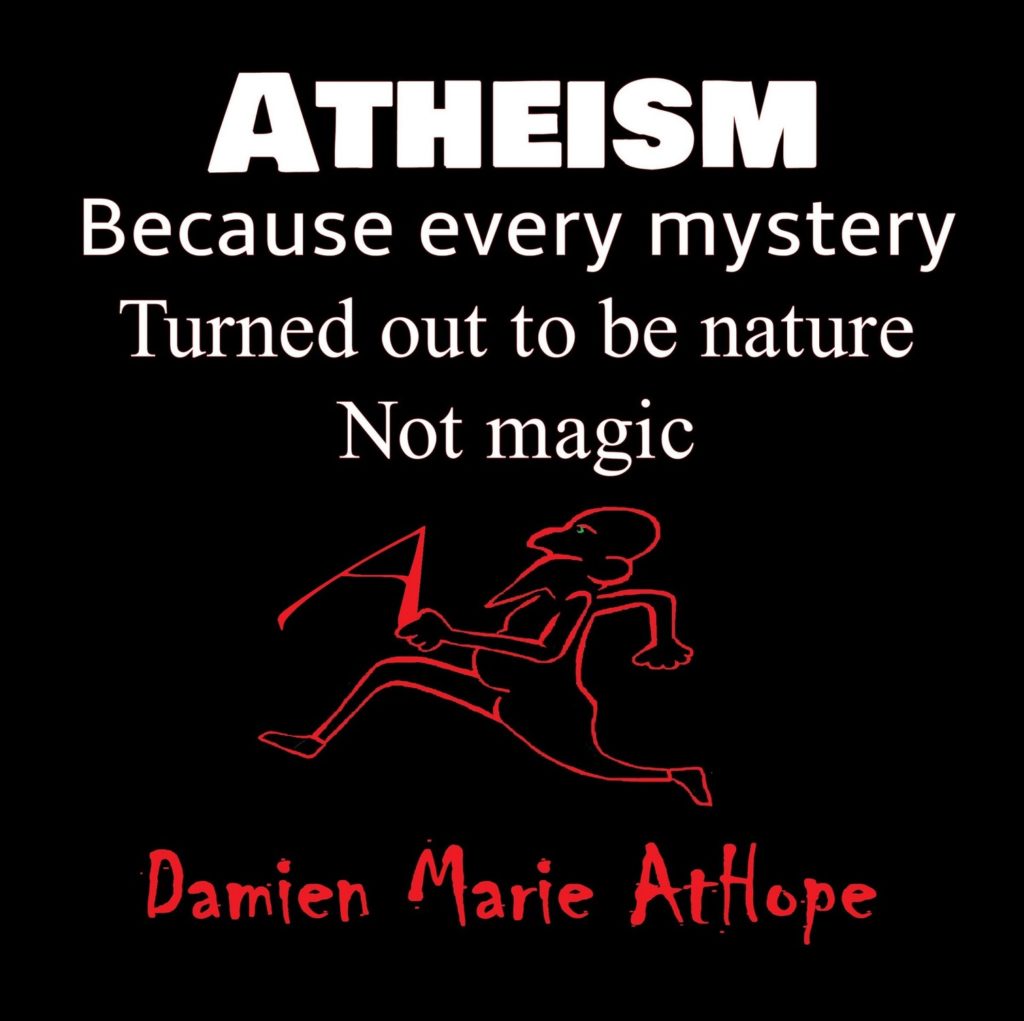
Reasons for or Types of Atheism
Marquis Amon “Atheism is a conclusion, how did the commenter conclude that? By what evidence, but what methodology was used? The correct answer is meaningless if the wrong thinking was used such as nihilistic atheism lol.”
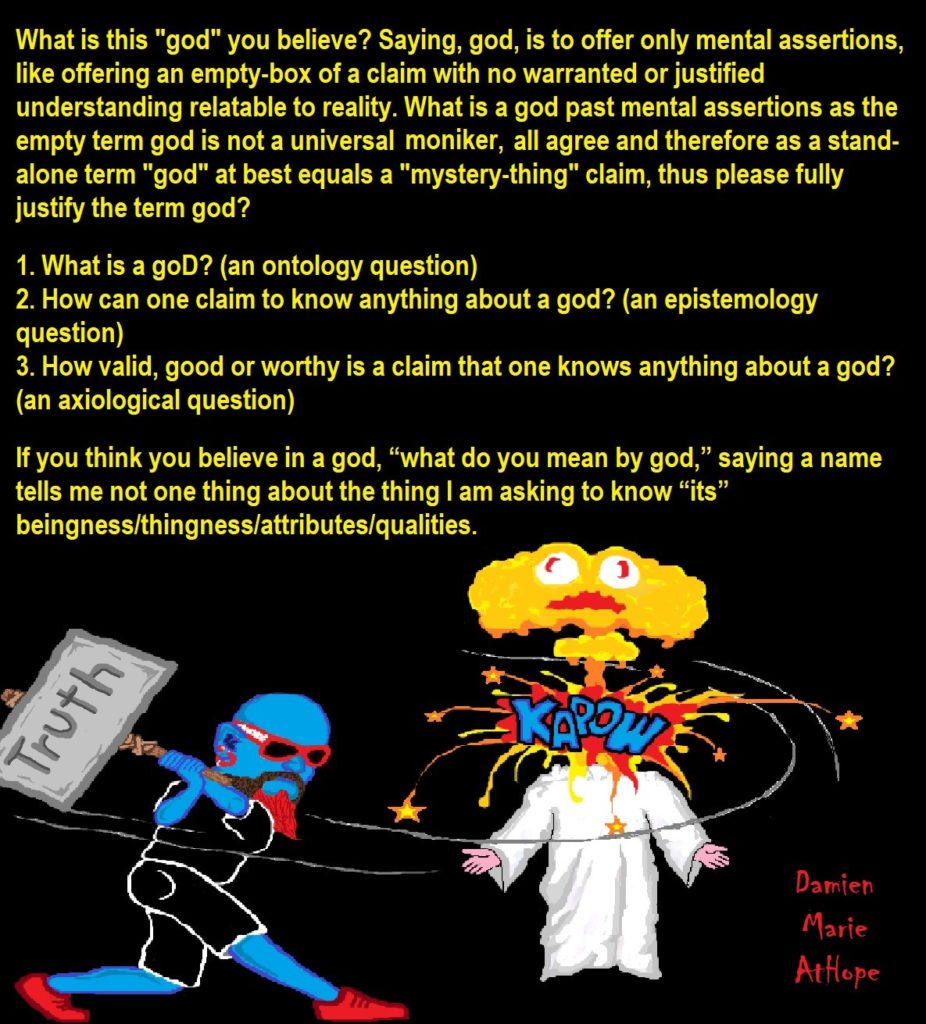
Damien AtHope on YouTube
My Blog, My Memes & Short-writing or Quotes
Here is my external pages or content: Facebook Witter Page, My YouTube, My Linkedin, Twitter: @AthopeMarie, Instagram: damienathope, Personal Facebook Page, Secondary Personal Facebook Page, Main Atheist Facebook Page, Secondary Atheist Facebook Page, Facebook Leftist Political Page, Facebook Group: Atheist for Non-monogamy, Facebook Group: (HARP) Humanism, Atheism, Rationalism, & Philosophy and My Email: damien.marie.athope@gmail.com
